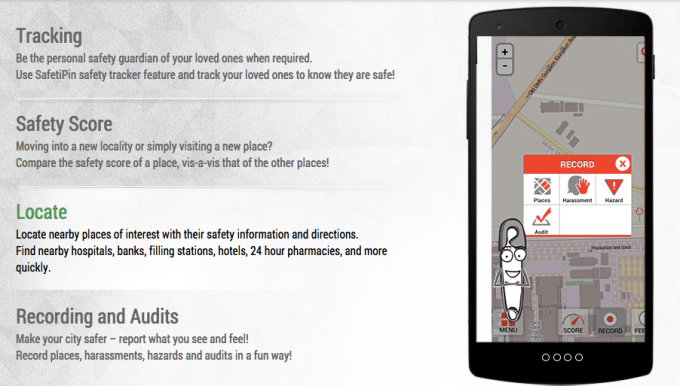Uber is again increasing its focus on passenger safety after it announced a partnership with mobile safety and auditing service Safetipin, starting in New Delhi, India.
New Delhi is, of course, the city where a passenger was alleged raped by an Uber driver in December. In the aftermath of that incident, the U.S. company has (finally) introduced stricter background checks for drivers, and added an in-app panic button and location/journey sharing features — this coming-together is another effort to improve safety in the Indian city, the company said.
Safetipin’s mobile app is essentially a guide to the safety of cities and locations across the world. It includes a ‘safety score’ for towns and cities created by the service’s nine-point audit — which covers the lighting, openness, visibility, security, walk path, crowd and gender diversity and density of each location. That’s supplemented by data from users, who can upload photos and details of flashpoints and incidents at places they visit.

Uber said it will “advance the contribution to Safetipin’s data collection efforts” by allocating partner drivers within its fleet who will effectively be Safetipin data gathers for a five-month test period that begins February 25. More precisely, selected drivers — who will be specifically trained — will use exterior-mounted camera phones to snap night-time photos from a range of locations at regular intervals — the photos will then be tagged and analyzed using Safetipin’s nine-point system.
As well as helping to cover new areas, Uber said the collaboration will enable the companies to re-assess locations to measure potential improvements. The city government and planners are also onboard with these efforts, Uber said.
The partnership is starting in India, but Uber plans to tap into its global network to extend it to other parts of the world.
“The initiative will be rolled out across other global markets in the coming months, including Bogotá, Colombia and Nairobi, Kenya with the aim to cover approximately 20,000 km of city roads and areas,” the company said in an announcement.
It is easy to be cynical and call this partnership a marketing ploy post-New Delhi rape. In fact, Uber’s failure to adequately cover safety issues before that incident practically invites that approach. But it is an interesting thought that Uber’s global logistics network could be used to help non-profits or ‘good causes’ across the world in the future.
That global footprint has always been viewed as an opportunity to expand Uber’s breadth of services, and that’s doubtless still true, but the company could also use its international reach to do good. We’ll see if that’s part of the ‘new’ Uber’s strategy, and just how sincere that it is, over time.
